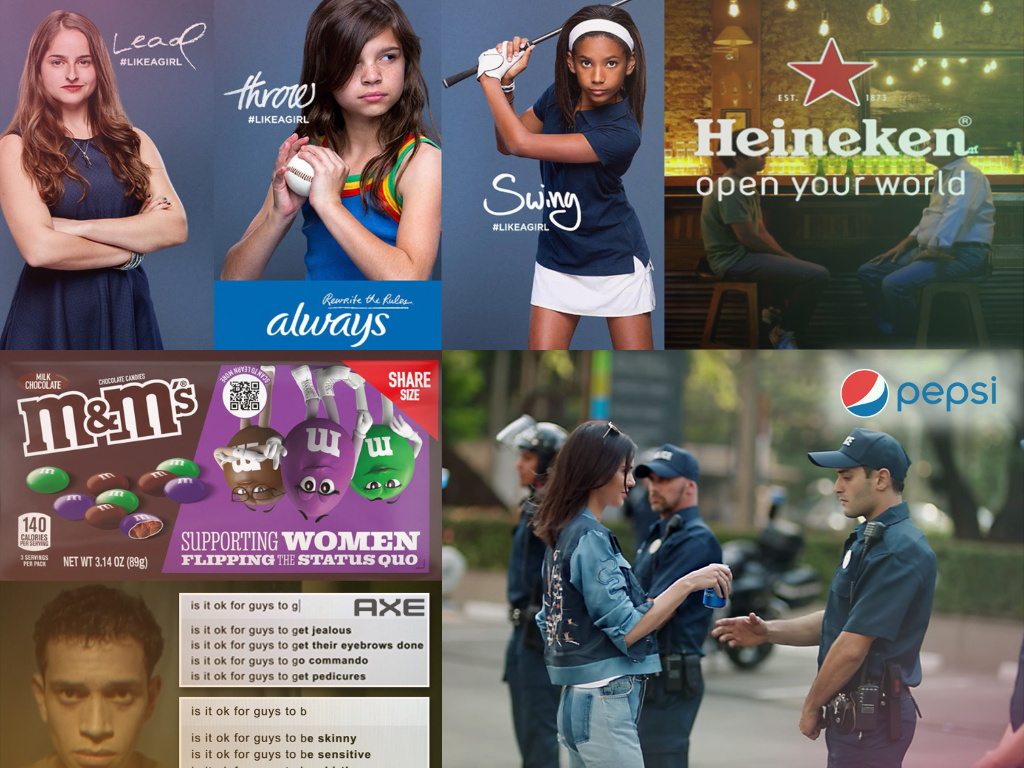Opinion | Enough with the woke ads
A somewhat new advertisement strategy that is being used to attract younger consumers is using social issues in ads to convince them that the companies share their values and entice them to buy from them. Photo collage by ANGELINA HICKS, editor-in-chief
From the highly criticized Black Lives Matter Pepsi ad to the highly talked about M&M woke campaign, woke advertising is everywhere. But considering how much backlash most companies get on their ads that tackle social issues, is it actually working?
A lot of companies have already tried featuring social issues in their ads to appeal to the younger generations. There’s the #likeagirl ad that Always aired during the Super Bowl, which encouraged people to stop using “like a girl” as an insult. There’s also the “is it ok for guys…” Axe campaign that uses questions guys google to expose the effects toxic masculinity have on men.
Or how about the Gillette ad that tackled the #MeToo movement? Or the Heineken “Worlds Apart” video that had people from opposite sides of issues talk to see if they could find common ground?
Emilia Cuevas Diaz, opinions editor
There are so many examples of these kinds of advertisements, and for every single one of them, there’s a controversy that came with it. The #likeagirl campaign was criticized for being “emotionally exploitative” and providing no real solution to the issue. Axe’s ad was condemned for its surface level effect with no real change.
Gillette faced boycotting for it’s “feminist propaganda” and Heineken was denounced for making people think that “social problems can be resolved if only people tolerate their oppression just a little while longer.”
But despite all those controversies, companies keep coming out with new marketing strategies that include a social issue in one way or another. So is the saying, “All publicity is good publicity” true, or are the companies desperate to reach this younger demographic that specifically looks for brands that share their values?
Is it ethical for brands and companies to address social issues in their advertisements when their goal at the end of the day is to make money?
Perhaps it is that companies feel that the risk of having an ad backfire is better than the alternative of having consumers believe they have no regard for social issues at all, but if I’m being honest, I don’t particularly care that much about how the effect woke ads have on multimillion dollar companies. I care about what happens to the causes they are exploiting for their own profit.
Every time a company uses a social issue as a marketing ploy it derails the conversation from what actually matters. For example, when Pepsi came out with its BLM ad, people’s focus shifted from all the important issues that were being talked about to wanting to boycott Pepsi for being tone-deaf.
Companies need to stop using social issues to divert the attention of people to whichever shiny new product they have. Not only does it distract from what’s actually important, but it utilizes the issues they claim to care about so much in an attempt to make a profit.
The #MeToo movement is not a marketing ploy to be used to sell razors — it’s a tool for women to feel empowered to come forward about being survivors. The BLM movement is asking for things that are too important to just be used as background for a soda ad.
These causes are too important to be trivialized by companies who are using them in their advertisements to be perceived as woke. Especially because more times than not, consumers are not fooled by the advertisements into believing that the brands actually care about the problems.
Perhaps a better way for companies to gain the attention of the younger generation is to be truthful about their values and actually embrace the causes they pretend to champion.


